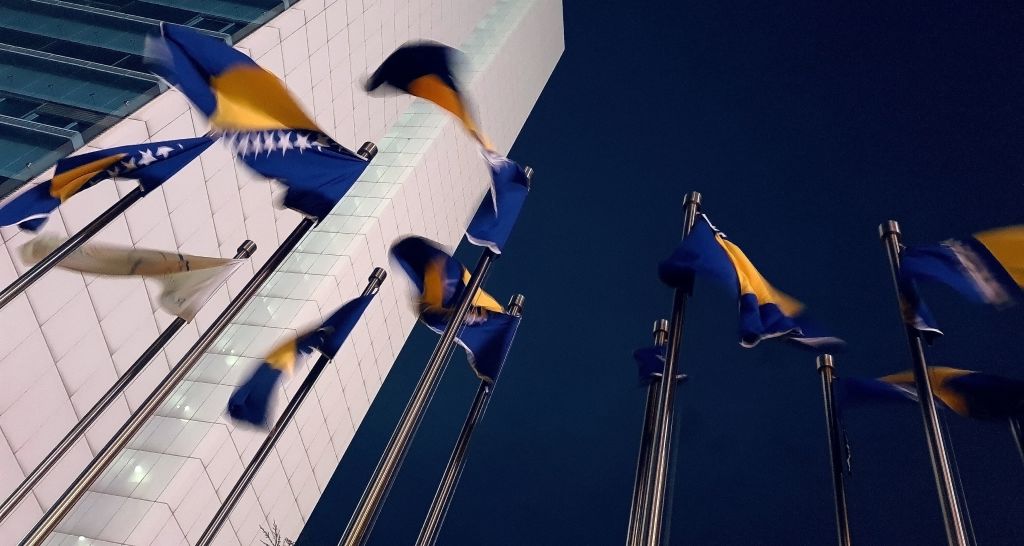Bosnian Serbs vote for greater autonomy, stoking fears of renewed conflict


A free daily email with the biggest news stories of the day – and the best features from TheWeek.com
You are now subscribed
Your newsletter sign-up was successful
Lawmakers in the lower house of the Republika Srpska passed a non-binding resolution Friday that would decouple the semi-autonomous republic from Bosnia's tax system, military, and judicial system, Reuters reports.
The Republika Srpska — also known as the Bosnian Serb Republic — was set up under international auspices in 1995.
Lawmakers who opposed the measure warned that it was a step back toward the dark days of the Bosnian War. Many members of the international community concurred, with the embassies of the United States, the United Kingdom, France, Germany, Italy, and the European Union releasing a joint statement calling the resolution an "escalatory step."
The Week
Escape your echo chamber. Get the facts behind the news, plus analysis from multiple perspectives.

Sign up for The Week's Free Newsletters
From our morning news briefing to a weekly Good News Newsletter, get the best of The Week delivered directly to your inbox.
From our morning news briefing to a weekly Good News Newsletter, get the best of The Week delivered directly to your inbox.
The Associated Press reports that tensions in the western Balkans are on the agenda for the G7 summit that opened Saturday in Liverpool.
For proponents of greater autonomy, the entire system that was set up at the end of the Bosnian War was a mistake. Milorad Dodik, the Serb member of Bosnia's three-person inter-ethnic presidency, favors removing the framework established in 1995 by the Dayton Agreement. "Bosnia is an experiment ... I don't believe it can survive because it does not have an internal capacity to survive," he said.
Under the Dayton framework, Bosnia and Herzegovina remains one nation but is divided into two enclaves: the ethnically Serbian Republika Srpska and the ethnically Croat and Bosniak Federation of Bosnia and Herzegovina. Most governmental functions devolve to the semi-autonomous governments of these entities. The nation's presidency is constitutionally required to be made up of a Serbian, a Croat, and a Bosniak.
A free daily email with the biggest news stories of the day – and the best features from TheWeek.com
Grayson Quay was the weekend editor at TheWeek.com. His writing has also been published in National Review, the Pittsburgh Post-Gazette, Modern Age, The American Conservative, The Spectator World, and other outlets. Grayson earned his M.A. from Georgetown University in 2019.
-
 Local elections 2026: where are they and who is expected to win?
Local elections 2026: where are they and who is expected to win?The Explainer Labour is braced for heavy losses and U-turn on postponing some council elections hasn’t helped the party’s prospects
-
 6 of the world’s most accessible destinations
6 of the world’s most accessible destinationsThe Week Recommends Experience all of Berlin, Singapore and Sydney
-
 How the FCC’s ‘equal time’ rule works
How the FCC’s ‘equal time’ rule worksIn the Spotlight The law is at the heart of the Colbert-CBS conflict
-
 Rubio boosts Orbán ahead of Hungary election
Rubio boosts Orbán ahead of Hungary electionSpeed Read Far-right nationalist Prime Minister Viktor Orbán is facing a tough re-election fight after many years in power
-
 Key Bangladesh election returns old guard to power
Key Bangladesh election returns old guard to powerSpeed Read The Bangladesh Nationalist Party claimed a decisive victory
-
 Epstein files topple law CEO, roil UK government
Epstein files topple law CEO, roil UK governmentSpeed Read Peter Mandelson, Britain’s former ambassador to the US, is caught up in the scandal
-
 Iran and US prepare to meet after skirmishes
Iran and US prepare to meet after skirmishesSpeed Read The incident comes amid heightened tensions in the Middle East
-
 EU and India clinch trade pact amid US tariff war
EU and India clinch trade pact amid US tariff warSpeed Read The agreement will slash tariffs on most goods over the next decade
-
 Israel retrieves final hostage’s body from Gaza
Israel retrieves final hostage’s body from GazaSpeed Read The 24-year-old police officer was killed during the initial Hamas attack
-
 China’s Xi targets top general in growing purge
China’s Xi targets top general in growing purgeSpeed Read Zhang Youxia is being investigated over ‘grave violations’ of the law
-
 Panama and Canada are negotiating over a crucial copper mine
Panama and Canada are negotiating over a crucial copper mineIn the Spotlight Panama is set to make a final decision on the mine this summer
